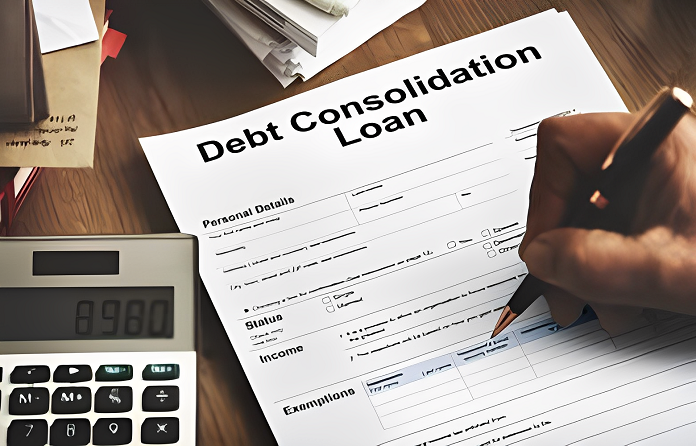Introduction
Navigating the labyrinth of debt consolidation options can be daunting, especially for low-income individuals striving for financial stability in the US. With many strategies available, choosing the right path toward debt relief requires careful consideration. This guide aims to demystify the process, presenting a comprehensive overview of debt consolidation options tailored for those with limited financial resources. By understanding these alternatives, low-income earners can make informed decisions to regain control of their finances and embark on a journey toward financial freedom.
Key Takeaways
What is debt consolidation?
Debt consolidation is a financial strategy employed to combine multiple debts into a single, more manageable debt. This process typically involves taking out a new loan to pay off various other debts, effectively consolidating them into one payment with potentially lower interest rates and more favorable repayment terms. This approach can simplify personal financial management and save money on interest over time.
How does debt consolidation work?
Debt consolidation works by obtaining a new loan or financial product that allows you to repay all your current debts, thus leaving you with only one ongoing payment. This new loan often comes with a lower interest rate than the average rate on your existing debts, reducing your monthly payments and making it easier to manage your finances. Additionally, consolidation extends your repayment period and provides a structured repayment plan.
Benefits of debt consolidation for low-income individuals
For low-income individuals, debt consolidation can offer several benefits, including reduced monthly payments, lower interest rates, and a simplified financial situation. It also helps avoid late fees and penalties associated with missed payments on multiple accounts. Moreover, consolidating debts can improve credit scores as consistent payments are made, demonstrating financial responsibility and creditworthiness.
Debt Consolidation Options for Low-Income Individuals
Option 1: Debt Consolidation Loans

How do debt consolidation loans work?
A debt consolidation loan involves a new loan to pay off multiple debts. Banks, credit unions, and online lenders typically offer this type of loan, and it may require collateral, such as home equity, to secure lower interest rates.
Pros and cons of debt consolidation loans for low-income individuals
Pros:
- Potentially lower interest rates
- Simplified monthly payments
- improved credit score over time
Cons:
- It may require collateral.
- Risk of falling into more debt if not managed properly.
- Initial fees may apply.
Option 2: Credit Counseling
What is credit counseling?
Credit counseling is a service that guides you in managing your debts, creating a budget, and improving your financial situation. Credit counselors work with you to understand your financial situation and suggest strategies or plans to help manage your debt.
How can credit counseling help low-income individuals?
Credit counseling agencies can offer personalized advice on budgeting, financial management, and debt consolidation options. They can also negotiate with creditors on your behalf to lower interest rates or monthly payments, making it easier to manage your debts.
Pros and cons of credit counseling for debt consolidation
Pros:
- Professional advice and assistance
- It may reduce interest rates and monthly payments.
- It can help avoid bankruptcy.
Cons:
- Some services may charge fees.
- Not all creditors may agree to negotiate.
- It may temporarily impact your credit score.
Option 3: Debt Management Plans

What are debt management plans?
Debt management plans (DMPs) are arrangements made through credit counseling agencies to pay off your debts within a specific timeframe. Under a DMP, you pay monthly to the counseling agency, which then distributes the funds to your creditors according to the agreed-upon plan.
How do debt management plans help low-income individuals?
DMPs provide a structured repayment plan with potentially lower interest rates and waived fees. This can make it more feasible for low-income individuals to pay off their debt within a reasonable period and avoid falling behind on payments.
Pros and cons of debt management plans for debt consolidation.
Pros:
- Reduced interest rates
- Waived fees and penalties
- One manageable monthly payment
Cons:
- It may take several years to complete.
- Requires discipline and a steady income.
- Some creditors may not participate.
Alternative Debt Consolidation Solutions for Low-Income Individuals
Managing multiple debts can be daunting for many Americans, particularly those with lower incomes. Understanding the various debt consolidation solutions available can be the first step towards financial freedom. Let’s explore some of these options.
Option 1: Balance Transfer Credit Cards
Balance transfer credit cards allow individuals to consolidate several high-interest credit card balances into a single card, typically featuring a lower interest rate or a promotional interest-free period.
How do balance transfer credit cards work?
To use a balance transfer credit card, you apply for the card and request the transfer of your existing card balances to the new card. If approved, your previous debts are paid off, and you now owe the balance on the new card.
Pros and cons of balance transfer credit cards for debt consolidation
Pros:
- Low or zero interest rates during the promotional period.
- Simplifies monthly payments by consolidating debt into one payment.
Cons:
- Potential for high fees on balance transfers.
- After the promotional period, interest rates can increase significantly.
Option 2: Home Equity Loans or Lines of Credit
Home equity loans, or lines of credit, leverage the equity in your home to provide funding that can be used for debt consolidation.
How do home equity loans or lines of credit work?
A home equity loan gives you a lump sum at a fixed interest rate, while a line of credit provides flexible access to funds up to a certain limit, typically with variable interest rates.
Pros and cons of home equity loans and lines of credit for debt consolidation
Pros:
- Lower interest rates than most credit cards and personal loans.
- Interest payments may be tax-deductible.
Cons:
- Risk of foreclosure if payments are not made.
- Longer repayment periods can accrue more interest over time.
Option 3: Debt Settlement
Debt settlement involves negotiating with creditors to settle a debt for less than the amount owed.
What is a debt settlement?
Debt settlement is when debtors or a hired third party negotiate with creditors to reduce the total amount owed, making it easier to pay off.
How does debt settlement work for low-income individuals?
For those with low incomes, debt settlement companies can negotiate on your behalf to lower your debt balances, but this service typically comes with fees.
Pros and cons of debt settlement for debt consolidation
Pros:
- Reduces the total amount owed.
- It helps avoid bankruptcy.
Cons:
- Fees can be high and decrease savings.
- It can negatively impact your credit score.
Tips for Choosing the Right Debt Consolidation Option

Navigating the options for debt consolidation requires carefully evaluating your financial situation and the available products. Here are some tips to help you make the right choice:
Assessing your financial situation
Start by reviewing your debts, income, and expenses. Understanding your financial capacity will help you identify the most feasible consolidation options.
Comparing interest rates and fees
Evaluate the interest rates and fees associated with each consolidation option. Lower rates can lead to significant savings over time.
Evaluating the reputation of the Debt Consolidation provider
Research the reputation of lenders or debt settlement companies. Look for reviews and testimonials from other clients to ensure their credibility.
Seeking professional advice
Consider consulting with a financial advisor or a credit counselor. These professionals can offer personalized advice based on your specific financial circumstances.
Conclusion
A recap of debt consolidation options for low-income individuals in the US
For low-income individuals in the US, navigating through various debt consolidation options is pivotal. These include obtaining a personal consolidation loan, enrolling in a debt management program, and considering a balance transfer credit card. Each option bears distinct advantages and eligibility criteria to reduce monthly payments and lower the interest rates on existing debts.
The importance of taking control of finances through debt consolidation
Taking control of one’s financial situation through debt consolidation is not just about managing debts more efficiently; it’s about regaining financial stability and peace of mind. Proper consolidation strategies can significantly reduce financial strain, enabling individuals to focus on long-term financial goals and improve their health.







